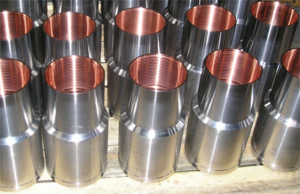Electroplating offers tremendous benefits that can be seen globally. Copper plating only adds to those benefits thanks to its many qualities. As copper has an incredibly high degree of conductivity, and provides corrosion resistance like no other metal, it’s ideal for so many applications. As well, copper has amazing anti-bacterial qualities and functions well in combination with lubricants.
What makes copper especially useful in the plating process, is its compatibility with other plating and coating systems.
Improving the Quality of Plating with Copper
 In combination with other metals in the plating process, copper serves to add its characteristics to the resulting coating. For example, nickel’s extremely high resistance to wear can be enhanced with additional corrosion protection that can only be found in copper. Together, the resulting surface is made to be very durable. Copper electroplating Alberta and Western Canada materials is one of our primary services.
In combination with other metals in the plating process, copper serves to add its characteristics to the resulting coating. For example, nickel’s extremely high resistance to wear can be enhanced with additional corrosion protection that can only be found in copper. Together, the resulting surface is made to be very durable. Copper electroplating Alberta and Western Canada materials is one of our primary services.
Further Details About the Benefits of Copper Plating
As we’ve outlined, copper is an extremely important material when it comes to plating. Here is a slightly closer look at some of the ways copper can help impact the plating process:
- Conductivity: Outdone only by silver, copper stands as the second most conductive metal there is. The difference between silver and copper it in price, making copper the metal of choice when it comes to industrial and commercial use. That’s why copper is widely found in all kinds of electrical components.
- More About Adhesion: Copper creates a smooth and even protective layer on ferrous and non-ferrous metals during the electroplating process. This coverage provides a reliable undercoat for additional plating finishes or top-coats. Regardless of how the substrate is manipulated, the copper layer remains intact to offer its unique characteristics to the final product in conjunction with the layers that it holds. Those often include nickel, aluminum, and tin.
- Corrosion Resistance: While copper is not the most corrosion-resistant metal available, when added to the substrate in combination with another highly corrosion-resistant metal like nickel, it results in a combination that can withstand an extremely corrosive environment. For this reason, copper and nickel are commonly paired when dealing with possible corrosive situations.
- Cost-Effective: As copper can be found in abundance, it is invariably much lower in cost than other noble metals like gold, silver, and platinum. This makes copper the metal of choice when cost savings are needed on a project, as long as its qualities of the metal match the desired results required to complete the electroplating process.
Without copper as an option, we may find ways to handle electroplating to achieve what we need, but copper makes the finished product less expensive and more versatile. The benefits of copper in electroplating make the metal very worthwhile.
